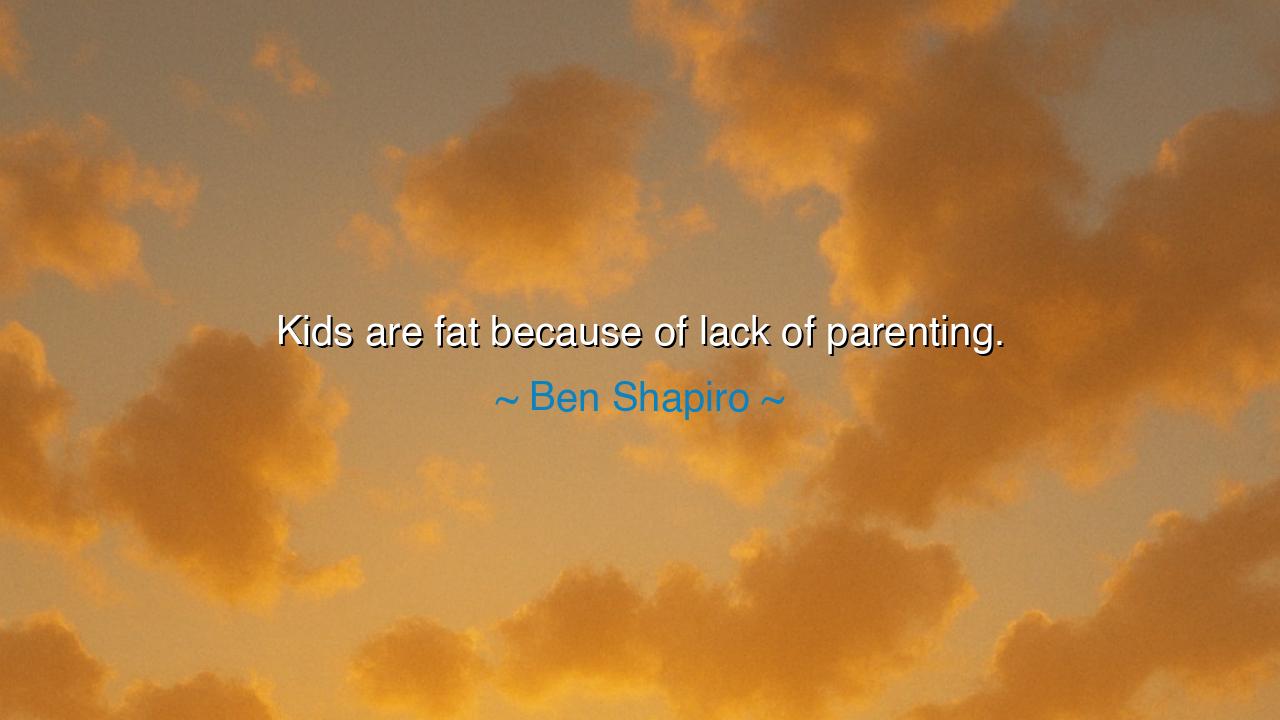
Kids are fat because of lack of parenting.






The words of Ben Shapiro—“Kids are fat because of lack of parenting.”—strike like a blunt sword, cutting directly to the heart of responsibility. Though his tone may be harsh, his meaning touches an ancient truth: the condition of children reflects the vigilance or neglect of those who raise them. For children do not yet command their own appetites, nor do they understand the measure of discipline. It is the role of the parent to guide, to set boundaries, and to lead by example. When this role is abandoned, the child suffers not only in body, but in spirit.
The ancients knew that discipline in the household was the foundation of strength in the city and the state. In Sparta, children were not left to indulgence, but trained to endure hunger, hardship, and labor, that they might grow into citizens capable of carrying the burdens of their people. In Rome, fathers bore the sacred duty of patria potestas—the power to shape the conduct and health of their children. To let one’s child fall into weakness or excess was not merely a private shame, but a dishonor to the whole family line. Shapiro’s words echo this timeless creed: when children fall into ruin, often it is not fate, but the absence of parental guidance.
History bears witness to this lesson. Consider the reign of King Louis XVI of France. His court was drenched in indulgence, excess, and gluttony, while the people starved. The children of nobility were raised without restraint, fattened not only in body but in vanity, blind to the hunger of their countrymen. When the Revolution came, it swept away that entire order, for it had lost the discipline that sustains nations. From palaces to peasantry, the truth is the same: indulgence without guidance breeds collapse.
Yet Shapiro’s words, though severe, should not be taken as condemnation alone, but as a call to action. For a child’s body is but the outward mirror of the inward lessons they receive. When parents feed without care, when they permit endless hours of idleness, when they themselves live without measure, they teach their children that excess is acceptable. But when parents set boundaries, when they demonstrate moderation and discipline, they teach by example that strength, health, and balance are worthy goals. Thus, parenting is not merely provision—it is instruction.
The meaning is deeper still: it is not only about food or weight, but about the shaping of character. A child who learns to govern their appetite learns also to govern their temper, their desires, and their ambition. To master the body is the first step toward mastering the soul. But if a child is left unguarded, their cravings become their masters, and their will becomes weak. Parents, therefore, are not raising bodies only—they are raising rulers of the self.
The lesson for us is clear: responsibility begins at home. Do not blame the schools, the markets, or the world, before first asking what habits you have nurtured in your own house. Teach your children by your actions. Share meals of moderation. Encourage movement, play, and labor. Speak not only of indulgence, but of balance, and live by that balance yourself. The parent who commands themselves commands also the future of their children.
Therefore, let your actions be these: do not give in to every demand of your child. Teach them patience, teach them moderation, teach them discipline through daily practice. Resist the temptation to soothe with sweets or to silence with indulgence. Instead, strengthen their will by helping them endure small denials, for these denials forge resilience. Know that each small act of restraint builds a wall of strength that will protect them in adulthood.
Thus, Ben Shapiro’s words, though sharp, reveal an ancient and enduring truth: when children falter, it is the duty of parents to examine their own guidance. Parenting is the shield and sword of the next generation. To neglect this role is to leave children unarmed in a world that demands strength. But to embrace it with love and discipline is to forge sons and daughters who will stand tall, strong in body and steadfast in spirit, ready to endure and to flourish.






AAdministratorAdministrator
Welcome, honored guests. Please leave a comment, we will respond soon